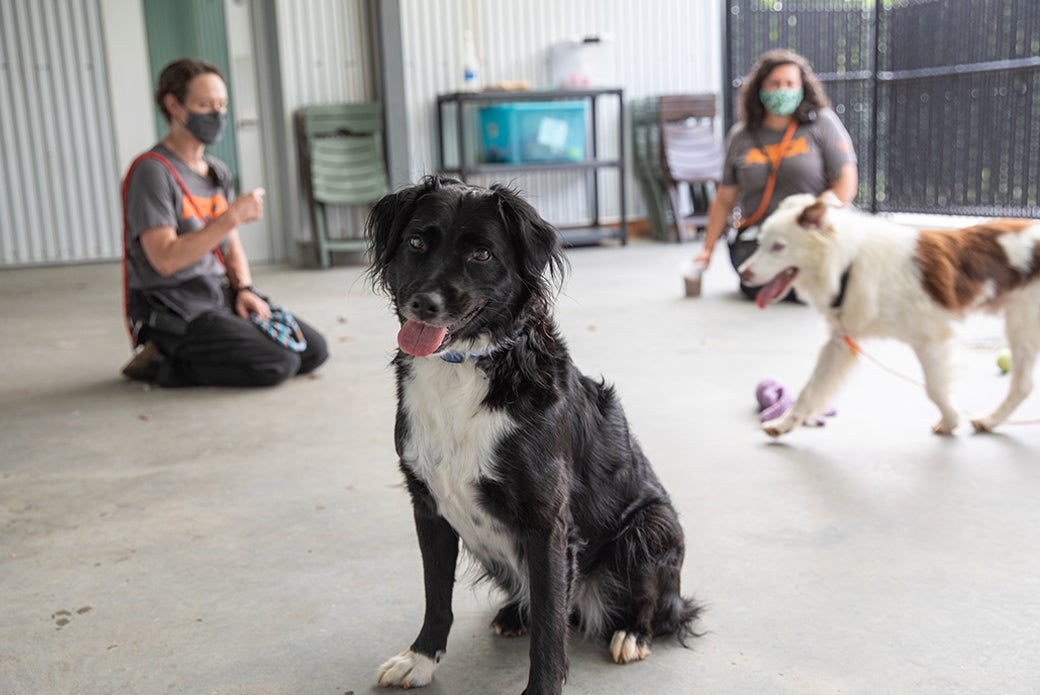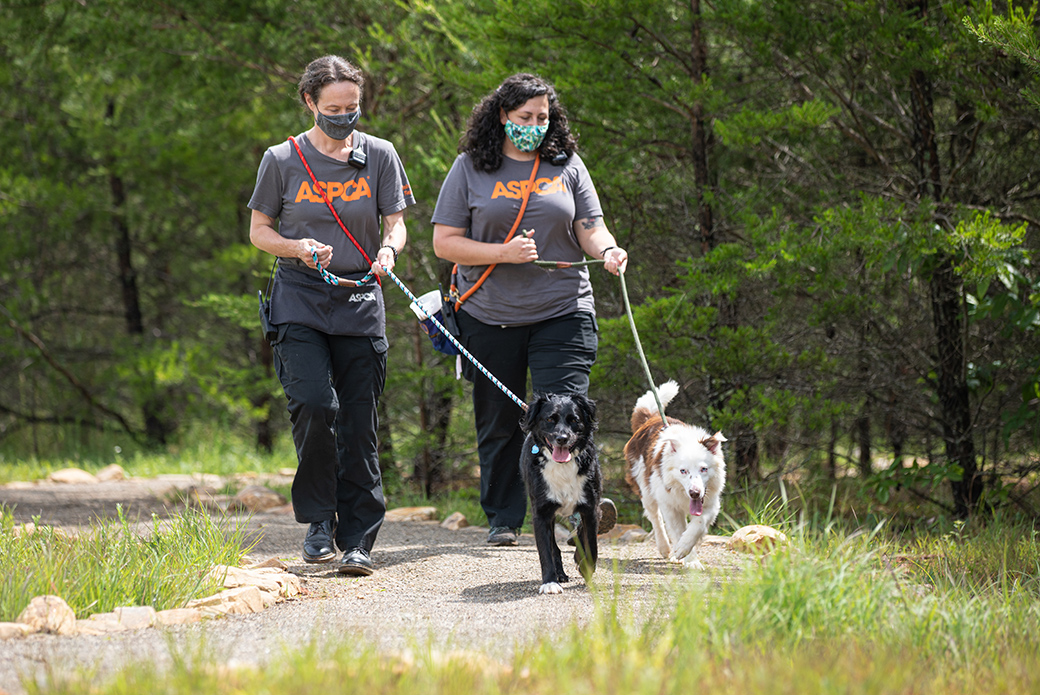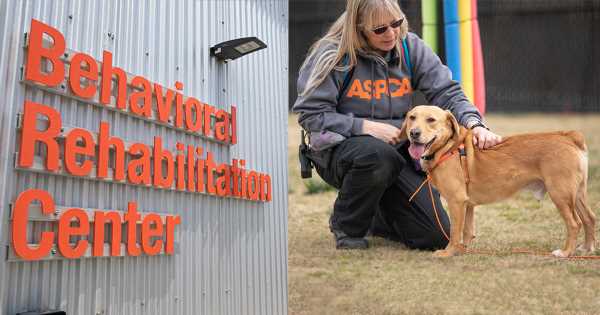

This month marks the five-year anniversary of the ASPCA Behavioral Rehabilitation Center (BRC), a first-of-its-kind facility in Asheville, North Carolina, dedicated to the study and rehabilitation of homeless dogs suffering from severe fear and undersocialization. Since opening in 2018, the BRC has been treating rescued dogs including many from large-scale animal cruelty and neglect situations such as hoarding and puppy mills.
At the 25,000-square-foot facility, our experts implement specialized behavior modification protocols to improve the dogs’ quality of life and help them find loving homes. Treatment plans focus on helping dogs become comfortable with unfamiliar people, household objects and sounds, handling, walking on-leash and other real-life situations they are likely to experience in a home environment. Graduating dogs are transferred to shelters and rescue groups across the country for adoption or placed directly into new loving homes from the BRC in the Western North Carolina region.
Forging a New Path for Fearful Dogs Nationwide


Peonie, a recent BRC graduate, was among 65 dogs and puppies rescued by the ASPCA in April 2022 from unsanitary conditions on a central Georgia property. Many of these dogs suffered medical issues and were not receiving proper care. When Peonie arrived at the BRC, she displayed extreme fear of people and spent most of her time hiding in her kennel. But after 22 weeks of dedicated treatment, she became a completely different dog and was ready to become a companion animal. Peonie was transferred to one of our local partner shelters, Brother Wolf Animal Rescue in Asheville, North Carolina, where she found two loving adopters in early 2023.
“In five years, the ASPCA Behavioral Rehabilitation Center has directly saved the lives of hundreds of traumatized dogs and helped thousands more across the country through the wide sharing of rehabilitation techniques and resources that help animals overcome severe fears often caused by neglect and abuse,” said Matt Bershadker, ASPCA president and CEO. “Through the expansion of this insight and deep collaboration with our shelter partners, countless dogs across the country will be redirected from hopeless fates to new paths toward safe and loving homes they need and deserve.”
In a September 2022 ASPCA survey of shelters and rescues from all 50 states, more than two-thirds of shelter professionals said their inability to manage the frequency and severity of animal behavior needs is a top barrier to placing animals into adoptive homes. To maximize the impact of their direct work, the BRC shares best practices for working with fearful dogs to help address this need and advance the animal welfare field.
The knowledge gained through the BRC and other ASPCA teams’ work is shared through multiple channels, including the Learning Lab which focuses on integrating science-based behavioral care into all aspects of animal sheltering. The Learning Lab offers on-site, experiential workshops at the BRC for select shelter partners, in addition to virtual learning opportunities for shelter professionals nationwide. Since inception, the Learning Lab has attracted over 28,000 enrollments of animal welfare professionals for our in-person and virtual animal behavior workshops and eLearning courses, representing over 1,200 organizations across the country. More than 95 percent of surveyed learners said they are now better able to support the behavioral wellbeing of the animals in their care.
“Dogs coming into the BRC program, most victims of animal cruelty, have a heartbreakingly poor quality of life and no chance of adoption,” explains Kristen Collins, Vice President of Rehabilitation Services. “Not long after the program’s inception in 2013, we saw that the majority of these fearful dogs could recover, learn to enjoy life and become beloved adopted pets—outcomes that surprised us and inspired us to make the BRC a permanent part of the ASPCA’s work. Now, with an amazing, expanded team and facility in North Carolina, we’re able to improve and save so many more lives—not only as we continue to take on our own cruelty cases and rescue animals suffering from debilitating fear, but also as we share the BRC’s work with other animal welfare organizations via the Learning Lab.”
Looking Back on One of Our First Success Stories


Celebrating this milestone anniversary has been exciting as we think back on all the happy moments we’ve made possible, and all the second chances that are still to come. At the BRC, we hope to see as many new beginnings as possible for fearful dogs, dogs like our second-ever BRC graduate, Pocus. When we met her, Pocus was a very young stray who was trapped by a local North Carolina rescue, Sarge’s Animal Rescue. Pocus was terrified of shelter life, new people and being walked on leash, she tried to flee at every opportunity. Like many shelters across the country, Sarge’s Animal Rescue did not have the resources available to provide Pocus with the behavioral support and modification needed to address her fearful behavior. She was soon transferred to the BRC where our experts could help.
On her initial evaluation, it was noticed that Pocus loved other dogs and showed small but noticeable improvements in her fearful behavior when other dogs were present.
After almost 23 weeks in treatment, showing little to no fear in the same situations that she was once terrified of, Pocus graduated the program, becoming the second dog to ever do so. By this time, she had also formed a bond with Monica Body, who at the time was a Behavior Rehabilitation Specialist at the BRC and is now a Lead Instructor for the Learning Lab. Monica knew she had something very special with Pocus and decided to adopt her.


Five years later, Pocus is now a helper dog at the BRC, acting as a guide and giving confident canine support to fearful dogs during their rehabilitation. It’s safe to say Pocus has come full circle.
“Without the BRC, I would never have this incredible dog, who greatly enriches my life,” says Monica. “I’m so grateful that the BRC’s work with this unique population of dogs allows other pet owners to find the same joy in these dogs as I’ve found in Pocus.”
Pocus still stands out as a shining example of the impact the BRC can have on fearful dogs. As the work continues, we can’t wait to see more rescued dogs blossom and find the homes they deserve.
To help give dogs like Peonie and Pocus the chance of a happy life in a loving home, check out our BRC adoptable dogs! If you’re not in the North Carolina area, you can find adoptable animals through the ASPCA in Los Angeles, New York City and Columbus, Ohio. Or, find your local shelter today!
Source: Read Full Article
